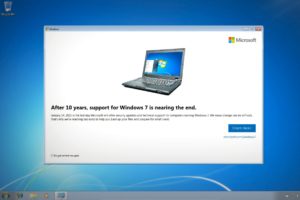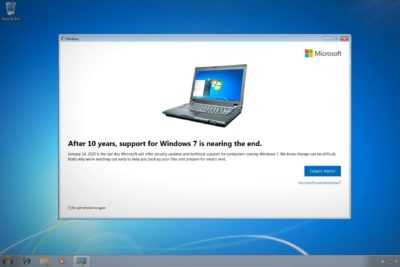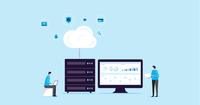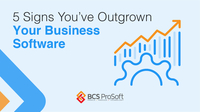 It’s the end of an era for one of the most popular operating systems from Microsoft. Windows 7’s “End of Life” is set for January 14, 2020. This means Microsoft will discontinue all support, including paid support; and all updates, including security updates.
It’s the end of an era for one of the most popular operating systems from Microsoft. Windows 7’s “End of Life” is set for January 14, 2020. This means Microsoft will discontinue all support, including paid support; and all updates, including security updates.
From now until January, Microsoft has put Windows 7 in “extended support.” During this phase, Microsoft is offering paid support for users but no longer offering complimentary service for the product. They will continue to provide security updates, but not design and feature updates.
Why is the Windows 7 Lifecycle Ending?
The Windows 7 “end of life” cycle is similar to that of previous Microsoft operating systems. Microsoft has said, “Every Windows product has a lifecycle. The lifecycle begins when a product is released and ends when it’s no longer supported. Knowing key dates in this lifecycle helps you make informed decisions about when to update, upgrade or make other changes to your software.”
Windows 7 was released in October of 2009. After a few missteps along the way to replace the OS, Microsoft has had Windows 10 running since 2015. User experience, security, and third-party software companies have all greatly improved with the current iteration, so it makes sense that Microsoft is calling it a day on Windows 7.
It’s like looking at your inefficient old car that takes hard to find parts and specialized technicians and wondering if it’s worth all the trouble.
What Now?
It’s estimated that over 25% of Windows users in the U.S. are still running Windows 7. That’s a lot of computers and there’s a chance that some of BCS ProSoft’s customers are on that list.
While there is no reason to panic – your computer will work the same on January 14, 2020, as it does today whether or not you upgrade – it is time to make some considerations.
As more and more software, including ERP software from Sage, Deltek, and NetSuite, are cloud-based the updates come from the manufacturer and can be set to auto-install. Those updates won’t come on an incompatible operating system. You’ll be stuck with old versions and miss those new features.
It’s also worth an upgrade for security. You work hard to grow your business and the last thing you want is fall victim of ransomware or something that easily penetrates an outdated system. Keeping software updated is always a step in the right direction for security and this is just another example.
This can be a big upgrade for companies, so reach out to BCS ProSoft with questions on how to upgrade your operating system and to be sure you have the most current ERP software available.







